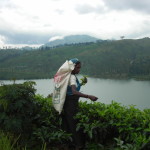Active Citizenship in Sri Lanka’s Hill Country

The tropical Island of Sri Lanka located in the Southern region of Asia, is best known for its natural beauty and tourism. Sri Lanka is striving to achieve socio-economic growth and development despite facing a three-decade-long armed conflict and other socio-political and cultural challenges.
by Madelaine Dickie
After a few days kicking around the salty streets of Sri Lanka’s capital Colombo, the tart cold air of Sri Lanka’s Hill Country comes as a shock. The Hill Country is an area of breathtaking scenery: tea plantations curve around the mountains, the gardens of old estate homes are full of roses, and in the mornings, beads of moisture smoke the windows. Despite the beauty, the people in Sri Lanka’s Hill Country are one of the most economically disadvantaged groups in Sri Lanka. Most of the people were brought to the area from India by the British to work on the tea plantations as migrant laborers. Today, key issues faced by those in the Hill Country are a lack of civic participation and the curtailing of people’s basic rights due to the old structures of governance.

SFCG began working in Sri Lanka in 2011, where it has a long-term strategy to promote a national dialogue for peacebuilding across ethnic, religious, and political dividing lines.
SFCG has been working to address these issues for the last 12 months through the ‘Promoting Active Citizenship in the Hill Country’ project. As part of this project, SFCG and the Sewalanka Foundation have run leadership training for young people and offered seed grants to youth clubs in the area to help them address a range of community development issues. We’ve also complemented this work with a community radio drama and talk show program produced in partnership with the Power Foundation.
Despite the short duration of the project, the benefits for the plantation communities have been manifold, particularly for youth. Nishantini, a 21-year old from the remote Battawate plantation, attended a leadership training run by SFCG. Prior to undertaking the training she had never left Battawate.
“Before the SFCG workshops, I lived in a box. Now I see that there are other ways and I am able to leave the box,” she said.

SFCG envisages an increase in the participation of youth and women in peacebuilding.
The training has inspired her to develop a concept for a business—she wants to start a cattle farm, the products of which will help support the poorest members in her community.
Another key outcome of the project is improved relationships between youth and estate management. Before the leadership training and seed grants, some youth clubs on the plantations had nothing to do with management. For many of the youth clubs, including the Shannon Youth Club, this relationship has now significantly improved.
Siraj, with his dimpled cheeks and an expressive face, is the charismatic President of the Shannon Youth Club.. He says through the leadership training the youth club gained the necessary skills to network, mobilize people, write project proposals, and apply for funding. The youth club is now working closely with police on a range of issues, including the registration of people for Census-related services. The estate management has been so impressed with their community involvement that they’ve connected the youth club with other NGOs looking to do work in the plantations. The Shannon Youth Club prepared a funding proposal for estate management and submitted it to the international NGO CARE. They were successful in securing funds to build a cultural centre in the division.
“Without the training, we would not have reached this high level of community involvement, development, interdivisional networking, and advanced communication with estate management and police officers,” Siraz said.
SFCG’s trademark use of media as a tool for conflict resolution has also had positive results through the broadcasting of a radio drama and especially a new talk show. The talk show, designed for the Hopten Division, Badulla District, explored the concept of encouraging extracurricular activities such as sport, music, and dance as a means of improving school retention.

The project aims to empower youth by improving their skills to become agents of positive social change.
After the talk show, volunteers came onboard to teach young people how to register sports clubs and music groups. One sporting group was registered and the sports ministry provided uniforms for the local volleyball team. In addition to being budding athletes, many of the young people in the area are also talented poetry writers so a poet was invited to the area to assist the youth in compiling and publishing a book of their selected poems.
Finally, as a result of the community radio programs, the youth club was asked to perform at a local drama competition. They won and proceeded to a district-level competition, where a second win earned them a cash prize. As if that weren’t enough, musically talented members of the club went on to form an orchestra ‘Extremes.’
One of the aims of SFCG’s project was to encourage young people to become agents for positive, long-lasting change in the plantation communities. In the above instances, it seems clear that many of the young people in the area have the vision, drive, and motivation to use their newly learned skills to build peaceful and equitable communities where basic rights are respected and where constructive dialogue is possible between all groups.
So there’s a reason to breathe a little easier over that next cup of Ceylon tea from the brisk and beautiful hills behind Colombo.
Madelaine Dickie was an intern with SFCG – Indonesia. Material for this blog piece was derived from both personal interviews and the ‘Case Studies Final Report’ by Lili Nikolova, a former intern with SFCG – Sri Lanka.








